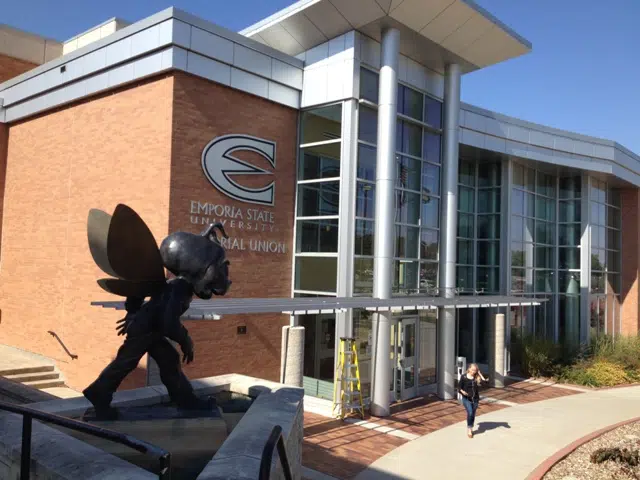Painful as they have been, the changes over the past six months at Emporia State University have found ongoing favor with the Kansas Board of Regents, including Chair Jon Rolph.
In an interview airing Wednesday on KVOE’s Newsmaker segment, Rolph said the reinvestments as part of Emporia State’s Framework for Workforce Management approved in September were designed to help ESU grow out of longstanding budget cuts, a national trend of declining enrollment and — ultimately — a risk of bankruptcy.
Audio PlayerESU has said it had a 29-percent decline in on-campus enrollment since 2017 and a 7-percent overall dip despite an increase of nearly 30 percent in graduate students the past five years. Ongoing budget cuts on an annual or near-annual basis have limited Emporia State’s strategic planning and put ESU on what Rolph says was “a clear path” to where bankruptcy, officially called financial exigency, was the university’s only option going forward. ESU ultimately gained approval for its Framework for Workforce Management, which opened the door for restructuring certain programs, cutting others and eliminating over 30 positions on campus, but Rolph says ESU was approaching a point where more dire changes could be “forced” on the university if leaders didn’t act.
Audio PlayerRolph says the expansion of Emporia State’s leadership team, now including administrators, deans, faculty, staff, students and Foundation representatives, was vital in helping to move the painful changes forward and “reset the prospects for the university.” He also credited President Ken Hush for being willing to act now instead of leaving that work for a future president. Having said that, he acknowledges there are still challenges ahead.
Audio PlayerReinvestment announcements have come periodically since the Framework for Workforce Management, including new or reopened positions, new programs and facility enhancements in disciplines like nursing; Liberal Arts and Sciences; Diversity, Equity + Inclusion; Social Sciences, Sociology and criminology; communications; business; teachers education and music.
The process was sharply criticized when it was proposed and eventually approved, and ESU is still under investigation by the American Association of University Professors for the impact staff cuts had on tenured faculty. Last week, the Foundation for Individual Rights and Expression listed ESU as one of the 10 worst colleges and universities nationwide for free speech. Rolph says the Board of Regents’ policy allowing for Emporia State’s changes, specifically on the staff side, expired in December and tenure was not “weakened” in any way as a result of the staff changes. He also says ESU was in a position where it had to cut its employee number because of prior trimming.
In an op-ed piece to KVOE News last week, Rolph urged Emporians to “participate in this transformation by contributing your abilities and strengths wherever and whenever you can.” The end goal of that step, he says, is to continue work to make ESU a welcoming atmosphere for students and to leverage Emporia State’s presence to enhance the area, whether through student engagement or workforce needs.
Opinion from Kansas Board of Regents Chair Jon Rolph
There is no doubt that Higher Education will look different ten years from now than it does today. Many factors have contributed to changing the economics both for universities and for students. We have recently faced these new realities head-on at Emporia State through an extensive and at times painful restructuring.
In line with national trends, on-campus enrollment at Emporia State has been declining for eighteen years resulting in budget cutting every year. This negatively impacts long-term strategies and limits our opportunities to create a bright future for our state’s first public university.
The Emporia community and Emporia State’s futures are intertwined in meaningful ways. In fact, a strong and vibrant Emporia State will contribute purposefully to the future economic opportunities and quality of life for Emporians and surrounding communities. It is imperative for Emporia, Emporia State, and for Kansas that we allocate our efforts and resources towards deliberate, well considered strategies that will make this relationship as prosperous as possible for the greatest number of people.
Earlier this month, my duties as Chairman of the Kansas Board of Regents afforded me the opportunity to spend some time with the expanded leadership team now guiding Emporia State’s future. There were Deans, Administrators, Faculty, Students, Staff, and Foundation representatives around the table. I was encouraged by the resolve and energy that I perceived in their comments and saw in their eyes. It will take uncommon determination, optimism, and broad support to get us there.
As we turn the corner into a new year and a new semester, I encourage every member of the Emporia community to participate in this transformation by contributing your abilities and strengths wherever and whenever you can. You have a committed group of servant leaders who are leading transformational change and need your support, encouragement, and partnership.















